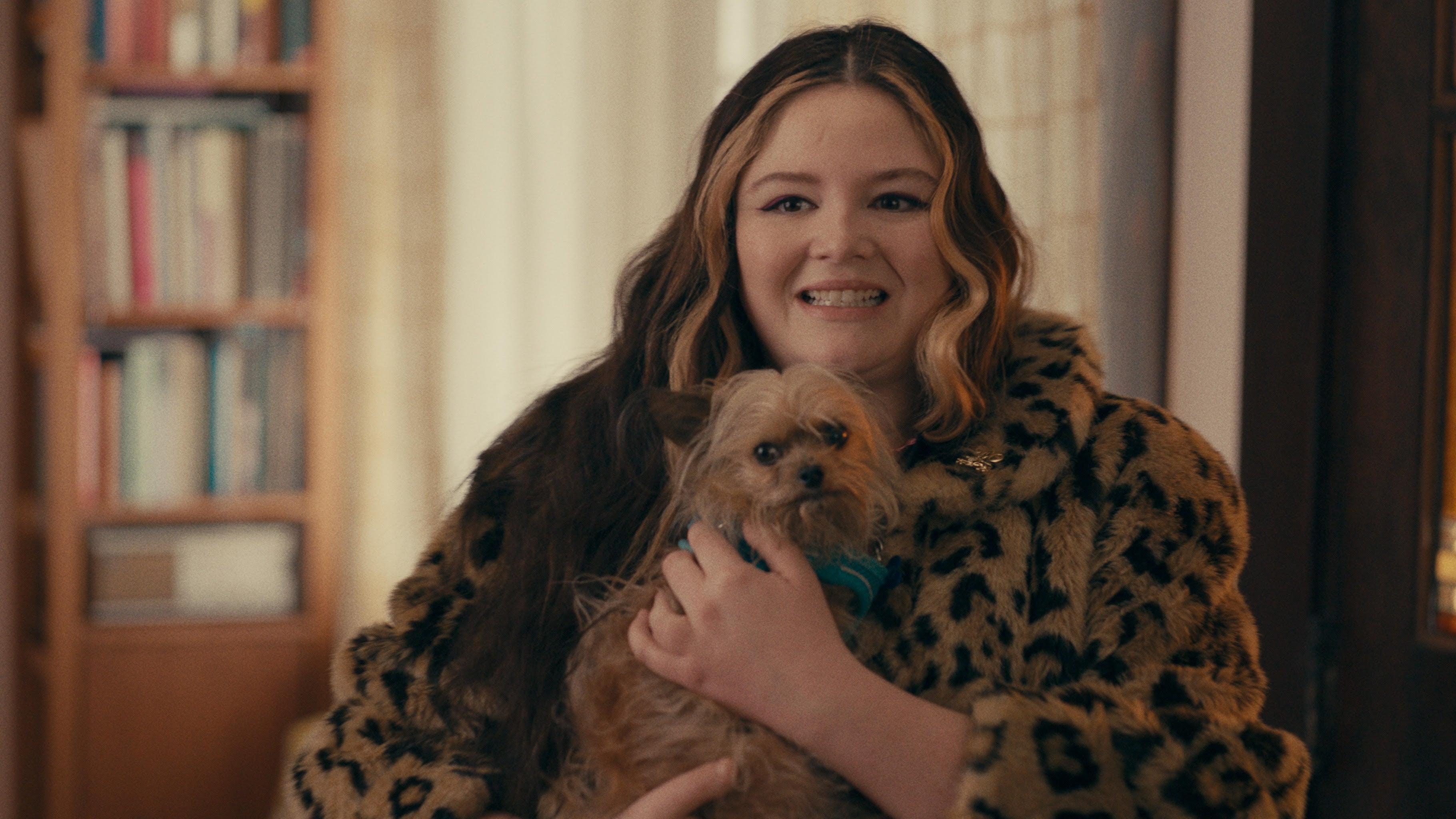Cora Bora review: Meg Stalter secures her status as the next big thing in a movie that isn't
The Hacks actor shines in a film that doesn't really offer anything else

Meg Stalter is a star. Her first-ever leading lady, Cora, is…not. Constantly lugging her acoustic guitar around like a depressed millennial Linus dragging his little blue blanket, Cora is an especially chaotic breed of girlfailure. She’s brash, cruel without cause, and not particularly self-aware about her own affect, place in the world, or obligation to any human being (or canine) past the end of her own nose. “Why do people keep asking me that?” Cora earnestly replies the fourth time someone asks her what’s wrong with her, each query coming in response to some overblown offense she doesn’t seem to realize she’s committed. (This time, she slept with an old friend’s boyfriend and gotten a phone chucked at her head in response.)
If this isn’t painting a full enough picture, it only takes Cora about 10 minutes of screentime to (willingly!) sleep with a flat-Earther, in the apartment he used to share with his very recent, very “live, laugh, love” ex. If Stalter wasn’t so damn charming, Cora would be an impossible hang. But the Hacks actor is such a bright light that the rest of Cora Bora can’t help but feel dim in comparison.
If you don’t do well with secondhand embarrassment, Cora Bora is not for you. Luckily, director Hannah Pearl Utt spells that out right up front, so if you can’t handle it, you still have plenty of time to leave and maybe just watch “The Megan Stalter Show” instead. Immediately, we’re thrust into a poorly attended Los Angeles open mic night (oof), as Cora muddles through a particularly painful original number. “Dreams are stupid and so are you for believing in them,” she sings (oof again). While Stalter has a decent voice, it’s not nearly enough to capture the meager crowd—who look like they’d rather be getting a root canal—or her manager/old friend (Chrissie Fit), who quits shortly after.
Cora’s love life isn’t going any better. On a call with her long-distance girlfriend, Justine (Jojo T. Gibbs), Cora hears another woman’s voice, and later sees evidence that the mystery woman might be fully living in the house she left behind in Portland. Cora and Justine are in an open relationship, as Cora insists to literally anyone who will listen, but it doesn’t seem to be going swimmingly—at least on Cora’s end. One impulse-bought ticket to crash Justine’s graduation party, stolen first-class seat, and fun cameo from Caitlin Reilly (a.k.a. “Girl who is ‘going to be okay’” girl) later, our intrepid disaster is back in Oregon, ready to make the days of everyone she runs into just a little bit worse.
As Cora Bora progresses, Cora becomes so cartoonishly awful that it’s hard to understand why any of these people continue to put up with her at all, even as begrudgingly as they do. (Ayden Mayeri, the only actor who can keep up with Stalter, gives a masterclass in passive aggressive digs as the other woman.) Far too late in the story, we learn that part of the reason for all this has to do with a tragic event that Cora suffered a few years back, which earned her an indefinite Get Out of Jail Free card with Justine and her family.
In reality, however, the reason Cora gets away with everything she does is that everyone not named Cora is woefully underwritten. Take The Good Place’s Manny Jacinto, for example, who plays a human-shaped doormat who randomly pops up like a fairy godmother to help with a broken guitar case or stubborn bouncer, for no other reason than that he’s apparently “drawn to broken people.” We don’t know anything about Justine other than that she’s Cora’s girlfriend; in a bit that doesn’t land, she’s listed merely as “Justine girlfriend” in Cora’s phone. Mayeri’s character gets a brief (brief!) pinch of interiority in the film’s final moments, but nothing that hasn’t been done a million times before. Even Cora’s big emotional climax feels abrupt and far too easily resolved to make up for the strife she’s put everyone else—including the audience—through.
And yet, Cora Bora is, in essence, a test to see if Stalter can support her own movie—one she passes with flying colors. Her overly-confident idiot schtick works shockingly well in feature-length form, and her ability to dole out one-liners with blink-and-you’ll-miss-it sincerity remains unmatched. (“The people in L.A. are like, really real. Like, they’re really trying to be something that they’re not…yet.” is a perfect line.) On its own, Cora Bora doesn’t offer anything new. But as an audition tape for Stalter’s future, it’s one of the more exciting things to come out of the comedy world this year.